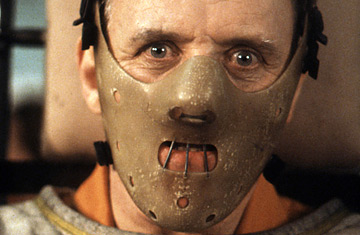
Sir Anthony Hopkins in "Silence of the Lambs"
(3 of 4)
HANNIBAL PROTECTOR
Say this for Hannibal Rising: it's better than Baby Looney Toons, Young Indiana Jones or The Phantom Menace. But it certifies a radical shift in Harris' attitude toward Hannibal that was first evident in the last book and nearly consumes this one.
Here's my guess as to what happened. Harris is known to invest himself totally in the characters he creates; his agent, Mort Janklow, has spoken of the "terrible burdens" of producing these books. It's only natural that Harris would look for redeeming features in the psychopath who'd lived in his head for a quarter century. He may also have fallen under Hannibal's spell. (Novelist Martin Amis, who admires the first two Hannibal books, said Harris has lately "gone gay on" Lecter") Could it be that, like Clarice, he began Silence as Lecter's skeptical profiler and ended Hannibal as his mesmerized partner?
Whatever the reasons, Harris wants to shift the audience's take on Lecter from horrified fascination to pity, or sympathy, or empathy. Hannibal Rising is his most explicit defense: not guilty by reason of insanity, with its roots in a childhood trauma.
Watching your precious kid sister get killed and eaten might well turn you into a psychopath who kills and eats people. The argument is plausible: the bitten becomes the biter, and takes his revenge by making sure the biters get bit. Plausible, yes, but a lot less interesting than the grownup spectacle of the super-Mensa, super-crazy Hannibal in the first two books.
To explain Hannibal is to remove the reason for his tenacious, voracious hold on readers: his otherness, odious and seductive, and unexplainable by delving into his past. As the good doctor himself argued (in Silence): "Nothing happened to me. I happened. You can't reduce me to a set of influences." Yet that's just what Harris started doing in Hannibal and what consumes the current volume. The author tries hedging his bets by writing, in Rising: "He is growing and changing, or perhaps emerging as what he has ever been." But the thrust of the book is to make Hannibal a victim stirred to righteous revenge. By allowing him to be understood, and in this conventional fashion, Harris risks diminishing him.
